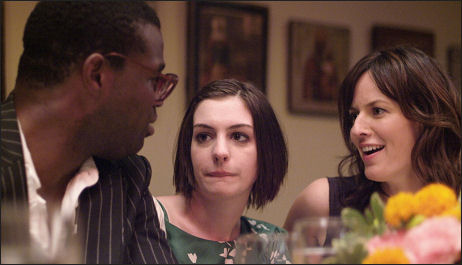“I mean, if I knew it would take me 15 years to get back in the saddle and work again because of the way I handled things, I really would have handled things differently. I just didn’t have the tools. I’m doing things differently this time around — understanding what it is to be a professional, be responsible and to be consistent. Those are things that weren’t in my vocabulary back then. Change for me didn’t come easy; I didn’t wanna change until I lost everything, until I realized that you better change, or, you know, blow your fucking brains out. Either you change and go on with life, or you’re just a piece of shit.” — Wrestler star Mickey Rourke speaking this morning in a Manhattan press conference, as passed along by Defamer‘s Stu Van Airsdale.
Rocket Girl
How Rhodes Scholar-ish is Kirsten Dunst? I’ve always suspected she’s not that intellectually agile but I’ve never cared enough to get into it. I’ve never seen any indications of same. But now I have, courtesy of MTV.com’s Josh Horowitz. Unless, you know, Dunst was putting him on. But I doubt it.
Horowitz recently interviewed Dunst and her How to Lose Friends and Influence People costar Simon Pegg, and decided at one point to digress into a minor two-question Star Trek quiz. Pegg, an ostensibly nerdy type, blew his answer and then Horowitz turned to Dunst, who explained before answering that “I like nerds I’m still a girl at the end of the day.”
Horowitz (switch to present tense) says he understands that so he’s going to toss her an easier one. So he asks “who’s the captain of the Enterprise is, as played by William Shatner?” And Dunst quickly answers “Spock” and then realizes that may not be right. Then she laughs to cover up her inability to remember the correct answer. And then Pegg leans over and says “Kirk, Kirk” and she says “Kirk!”
You can be a “girl” all you want, but not knowing Captain Kirk is like not knowing who Jesus Christ, Barack Obama, Superman or Abraham Lincoln are. It’s not a nerd term — it’s a term known to tne entirety of Western Civilization. The name “Captain Kirk” is a primal, fundamental concept that anyone with a semblance of an education can identify. I’ll bet $50 bucks that even that idiotic drunken Kentucky woman in that YouTube video that I posted two days ago knows who Captain Kirk is.
Brothers Bumped
Jim Sheridan‘s Brothers, which I’ve been very much looking forward to, being a fan of Jim’s work and Susanne Bier‘s original 2004 film, is being bumped into ’09 — possibly a late summer release, or possibly one in the fall. MGM had planned it to open it on 12.4.08, but now they’ll be taking it to next May’s Cannes Film Festival. Draw whatever conclusions you want, but the implication is that it’s not a quality issue as much as a concern that it might suffer against the heavy year-end competition.

Brothers director Jim Sheridan, costar Jake Gyllenhaal
This despite test-screening responses that seemed (emphasis on the “s” word) to indicate possible Oscar contention. Particular praise has gone to the performances of costars Jake Gyllenhaal, Tobey Maguire and Natalie Portman.
The MGM team wasn’t in the building from 9:15 to 10:45 am (even the receptionists didn’t answer) so I called Brothers producer Mike DeLuca, who confirmed the news. The decision to hold was basically due to the “crazy full fall for serious movies” this year, he says. “We love Brothers and want to blitz in Cannes, but it’s just too crowded this year for a wide fall release and an Oscar campaign.”
A key factor in the decision, he says, is that costar Jake Gyllenhaal is unavailable for year-end p.r. due to filming on Prince of Persia and “we can’t promote this movie without jake. So Cannes makes most sense. I’m super proud of the movie and a major unveiling on the Cote d’Azur with all cast present is too good to pass up.”

Tobey Maguire, Natalie Portman and mystery man on Brothers set.
An MGM source said that a mid to late summer release could conceivably happen due to next summer looking relatively weak,
As noted three or four times before on HE, Brothers is a remake of Susanne Bier’s 2004 Danish-language original about a younger “bad” brother (Gyllenhaal in Sheridan’s version) stepping into the familial shoes of his older “good” brother (Maguire) after the latter disappears during an enemy skirmish in Afghanistan.
Natalie Portman plays the wife-mother whose loyalties shift, or at least adapt to new realities. Sam Shepard plays the gruff and disapproving pater familias, the father of Gyllenhaal and Maguire. David Benioff (The Kite Runner, The 25th Hour) adapted the screenplay.
In a relatively recent interview with DGA magazine’s F.X. Feeney, Sheridan (or was it Feeney?) alluded to Brothers as a kind of Cain and Abel story.
Sheridan “had been very moved by that film when he first saw it, intrigued by the themes of intense love and lethal jealousy between two polar opposite brothers — one a career military man, the other a lifelong screw-up who only comes into his own by caring for his brother’s family after his super-achieving sibling goes missing in Afghanistan and is declared dead.

“Sheridan realized transposing a Danish drama for an American audience could be risky. ‘You can’t just microwave something,’ he says emphatically. ‘You can’t just reheat it.’
“The challenge is to find what works best in the story about Americans, for Americans. ‘There are rules that apply to American cinema that don’t apply to other forms of cinema,’ he explains. ‘In a Danish film, people can get drunk with impunity. They can leave their kids at home unattended while they go pick up their brother in the bar. In an American movie, you’re not allowed. Americans are different and the rules are different. So all the time I’m consciously working within a framework of American storytelling.'”
Battleground Uptick
New Quinnipiac University surveys taken last weekend and concluded on Monday show Barack Obama leading John McCain in Florida 51 percent to 43 percent, in Ohio 50 percent to 42 percent and in Pennsylvania 54 percent to 39 percent. These three states are the game. if these figures hold, Obama is as good as in.
QU polls conducted before and after the debate show post-debate gains in all three states. In Florida, Obama was up 49 to 43 pre-debate and 51 to 43 post-debate. In Ohio, Obama was up 49 to 42 pre-debate and 50 to 42 percent post-debate. In Pennsylvania Obama was ahead 49 to 43 percent pre-debate and 54 to 39 percent post-debate.
Pre-debate surveys ended at 8 p.m. Friday with post-debate surveys worked on from Saturday to Monday.
Plain Talk
“We’re all connected. As others have pointed out, you can’t save Main Street and punish Wall Street anymore than you can be in a rowboat with someone you hate and think that the leak in the bottom of the boat at his end is not going to sink you, too. The world really is flat. We’re all connected. Decoupling is pure fantasy.” — — From a 9.30 column by N.Y. Times guy Thomas L. Freidman.
Friedman also said, “I totally understand the resentment against Wall Street titans bringing home $60 million bonuses. But when the credit system is imperiled, as it is now, you have to focus on saving the system, even if it means bailing out people who don’t deserve it. Otherwise, you’re saying: I’m going to hold my breath until that Wall Street fat cat turns blue. But he’s not going to turn blue; you are, or we all are. We have to get this right.”
Puffer
Should have put this up earlier today. Speaks for itself. Newman the Great.
Best 9.30 Line
“This looks to be the Citizen Kane of Gen-X marital strife porn.” — HE reader James O. Incandenza wildly speculating about Sam Mendes‘ Revolutionary Road.
A New Beginning
Kim Voynar, late of Cinematical, has signed up with Movie City News as a writer-columnist-editor. Everything Voynar thinks, does, feels, believes in, dreams about, eats, breathes, longs for politically, wants to say and is looking to make happen is henceforth owned by MCN — lock, stock and barrel.
Props for Elsa
“Loved you writing about Kristin Scott Thomas, I’ve Loved You So Long and her Best Actress shot,” writes HE reader and Santa Barbara Film Festival director Roger Durling. “[But] how come there’s no love for Elsa Zylberstein, a Best Supporting Actress nominee if I ever saw one? Zylberstein is quite a terrific foil to Thomas. It’s through her eyes that we embrace Thomas’ character and stick with her. If this soulful sibling is willing to shelter and care for her, so are we. All the doubts the audience has about Thomas, Elsa believably faces and deals with, and finally she takes us where we dare not go. I think credit is due.”
Cut Down to Size
I don’t know who wrote this originally, but the spirit and the attitude are quite likable. And it makes sense to impose such terms in any Wall Street bailout deal. Thanks to HE reader Brendan for passing this along:
“Dear Wall Street,
“I’m speaking on behalf of a group called The Taxpayers of the United States. Now that we’ve rejected the first bailout plan, I’m sure that in the spirit of tough, free market capitalism and spirited negotiations, you’ll consider our second offer. Here are some terms that we trust you’ll find reasonable:
“(1) We are willing to loan you money at a very low, introductory rate of 8.9%. If you are even one nanosecond late on your payment, your rate will go from 8.9% to 32.9% — instantly. You will have no right to appeal this. The interest rate increase will be retroactive. And none of this ‘but I mailed it out Friday’ stuff. We must get it, and the check must clear, for your payment to count. Reminder: transactions that occur after 2pm are not credited until the next business day, so be sure to make your payments before then.
“(2) If you are late on any of your other payments to your other creditors, your rate will also be spiked to 32.9%. I know it has nothing to do with us, but if you are late paying someone else, then obviously you are a bigger credit risk to us.
“(3) We will send you onerous terms and conditions in 6 point font. Of course, those terms can change on a whim, at any time, so we’ll be sending you hourly updates to the contract, which we expect you to read and keep up with. Sorry — we will be the only ones that can amend the contract; you cannot.
“(4) You will have a predetermined credit line, and if you go over it by even $1, your interest rate will spike to 54.9%. Sorry, it’s in the contract on page 109,209,392.
“(5) The bankruptcy laws have now changed. If you get into a bind, I’m afraid you won’t find much sympathy. No more silly excuses will be accepted. We are going to have the titles to all of your buildings and physical assets put in our name, so when the inevitable time comes and you trip up, we’ll simply take everything from you. There will be no court hearing.
“(6) We’ll be conducting a background check, driving records check, drug test, and disease risk check of all of the top executives of your firm. After all, you’re a riskier loan if you have any of those afflictions, aren’t you? Well, if we find anything wrong, your interest rate will skyrocket, and without notice.
“(7) If your business is located in a bad neighborhood, a poor city, a hurricane zone or terrorist targeted city, as defined by us, we can raise your interest rates at any time, to any rate we choose.
“For the last quarter century or so, you’ve imposed these terms, or some variation of them, upon us when loaning us money or insuring us, arguing every single time that it’s ‘necessary’ and that these sorts of changes ‘will result in more profitable companies that will pass the savings along to consumers.’ Well, now that we’re in the role of lender, and you’re in the role of borrower, we’re sure that you’ll find these same terms fair.
“Wall Street, prove the cynics wrong and accept our new plan. Prove to everyone that you’re not the hypocrites that everyone thinks you are.
“Regards,
“Wallace Mangold, Attorney-at-Law, representing the Taxpayers of the U.S.A.”
Back and Forth
“I’m hearing schmaltzy,” a guy told me this morning about Joe Wright‘s The Soloist. That’s all you can share? I wrote back. How schmaltzy? Does it manifest right away, or does it…you know, hold off until Act Two or Three or what? I’m sensing a certain actorishness from Jamie Foxxin the trailer — is that a problem? Don’t tell me Robert Downey, Jr. isn’t good in this because Downey is on a roll and can’t fail.
Attitude Glow
Jonathan Demme‘s Rachel Getting Married (Sony Classics, 10.3) “is endlessly sociable, with people crowding the camera as if in a documentary, yet sometimes you want that camera to draw back and watch them from a distance — to see how they mill around in the frame rather than shifting the frame itself.

“The wedding party is the ultimate guide to Demme’s benign vision: the groom is black, the bride is white, she and her bridesmaids are dressed in saris, nobody so much as mentions race, and the officiating priest is played by Demme’s cousin, Father Robert Castle, about whom he made a fine film, Cousin Bobby, in 1992. I
“I don’t know if there were any Republican voters involved in this movie, but, if so, it must have been a lonely time. Just imagine if the rest of the crew found out. They would pin you down and sing to you until you changed your mind.” — from Anthony Lane‘s review in the current New Yorker, dated 10.6.08.

